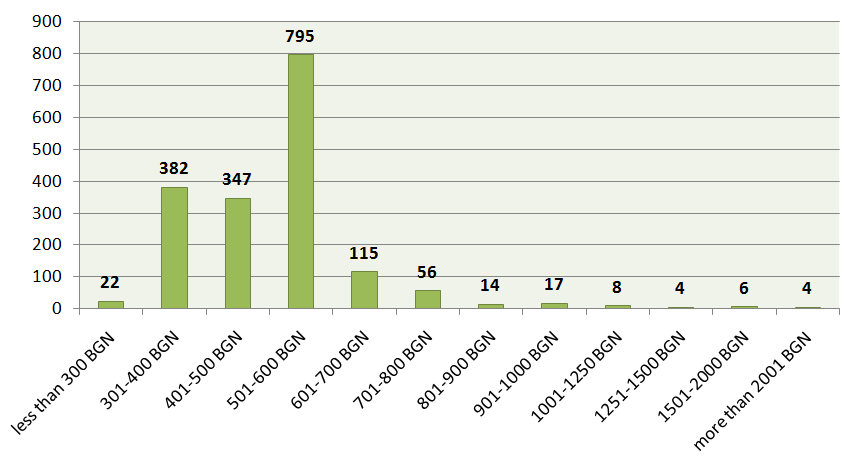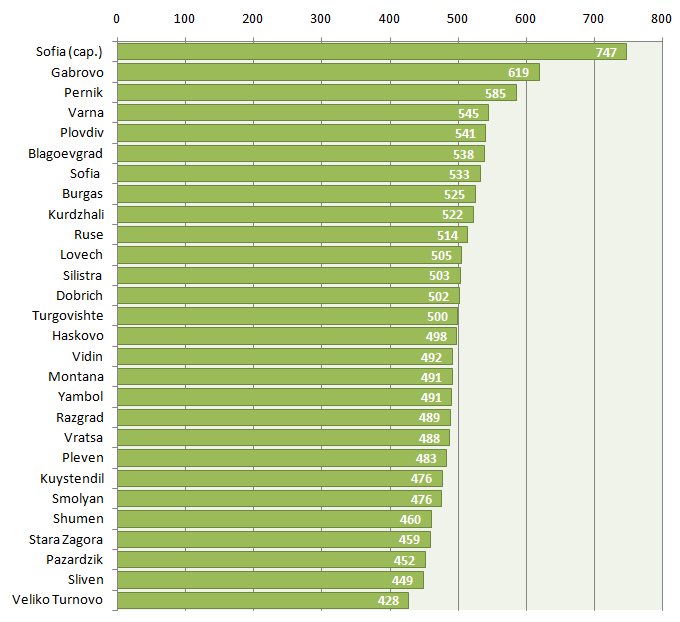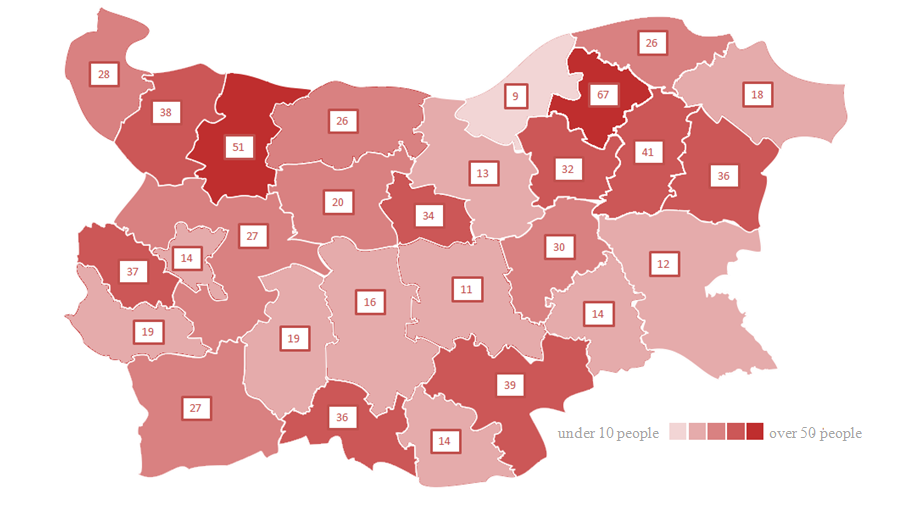Open Data Analysis: Job Vacancies and Salaries in Bulgaria
Yavor Aleksiev
The Institute for Market Economics and Infograf are joining the analysis of open data provided by the Open data portal for the Republic of Bulgaria. The results of our work will also be published on the official website of the project “Regional Profiles: indicators of development”.
The opening of the Employment Agency (EA) data for job vacancies announced in its territorial divisions allows the implementation of a new approach to the analysis of the labor market processes.
As of September 3rd 2015 the review of the EA data for the vacancies shows that:
- There are 14 771 vacant jobs advertised in 6 068 adverts;
- Among the active adverts 54% are for permanent contracts, 44.8% for temporary contracts and only 1.2% of the adverts are for civil contracts;
- 82.6% of adverts are for full-time jobs (8-hour working day), the second highest proportion (5.8%) is for working part-time (4 hours);
Announced payment:
- For nearly 70% of the vacancies there is no predetermined payment. This can potentially be seen as one of the factors that hinder labor mediation.
- With respect to the various types of contracts the salary is mentioned in 31% of the adverts for long-term contracts, 29% of the adverts for fixed-term ones and only 6% of the adverts for civil contracts[1];
- Weighted according to the number of vacancies in various adverts (as one advert can apply to more than one vacancy), the average gross salary for job vacancies in the country (based on 8-hour working day) is 536 BGN This is significantly lower than the average wage in the country, according to NSI (868 BGN gross wage by latest data from June 2015). A possible explanation is that the majority of vacancies are for positions involving lower skills and thus lower payments. Another part of the explanation can be found in the characteristics of the employers and the jobseekers, which use employment agencies as a means of securing or providing – public bodies, small- and medium-sized enterprises, which cannot entice prospective workers by offering attractive positions in terms of pay and working conditions. Employers usually resort to the more expensive services of private recruitment agenciesfor positions that require higher levels of expertise and liability where the pay is higher, but finding good staff – even more difficult.
- 421 (24%) of the 1 770 adverts with specified wages and working time and 1 346 (31.5%) of the total of 4 270 jobs with specified wages and working time (some adverts apply to more than one vacancy) were for a payment less than 420 BGN for an 8-hour working day (the level of the minimum wage from January 1, 2016). This relatively high proportion signals for one of the potential negative effects of raising the minimum wage in the beginning of 2016 to 420 BGN The rise in the minimum wage to that level will affect nearly a third of the 4 270 vacant jobs at the moment, for which there is accurate data on wage levels. Raising the minimum wage will not only affect existing jobs, but also the decision of employers to open new ones both at present and in future periods.
- Half of the job adverts with wage over 1 000 BGN (11 out of 22 adverts and 87 out of 122 jobs) are in the capital, while the majority of this type of adverts are for drivers, engineers and erectors.
Chart 1: Average monthly salary calculated on the basis of eight-hour working day, for the active job adverts as of September 3, 2015, that contain information on the duration of working time and the offered payment (number of adverts)

Source: EA, IME calculations
Regional Review
- At the regional level, the average salary (computed for an 8-hour working day) in active adverts and vacancies for which there is data on the level of pay and working time varies from 747 BGN in Sofia (capital) to 428 BGN in Veliko Tarnovo.
- Except for the capital, high level of offered payment can also be found in the districts of Gabrovo – 619 BGN and Pernik – 585 BGN. The salaries offered in Blagoevgrad, Plovdiv and Varna are also above the national average.
- Besides Veliko Tarnovo relatively low levels of pay are also registered in the districts of Sliven (449 BGN) and Pazardzhik (452 BGN).
Chart 2: Average salary for vacancies in the active job adverts, as of September 3, 2015 (BGN)
Source: EA, IME calculations
Number of unemployed competing for one available job
According to the latest official data of the EA on the number of registered unemployed persons (as of July, 2015), they amount to 309 781 people. The comparison of their number by districts and the number of vacant jobs as of September 3rd, 2015 shows that:
- The biggest number of unemployed people competing for one workplace is in Razgrad – 67 people, while the lowest is in Ruse (9 people). On average 21 people compete for each available job opening.
- 25 unemployed people in Northern Bulgaria and 19 unemployed people in Southern Bulgaria are competing for a single job. The combination of low employment rates and high unemployment rates in the Northern part of the country makes finding a job a serious challenge.
It should be noted that only some of the unemployed are an actual match for the advertised jobs; in some cases there are no unemployed whose qualifications, background and experience fulfill the employer’s demands. I.e. theoretically it is possible to have 67 candidates competing for one vacancy, while all of them are unsuitable for the job.
Chart 3: Number of unemployed who are competing for one vacancy
Source: EA, IME calculations
|
|
Vacancies (as of September 3, 2015) |
Registered unemployed (July) |
Unemployed for 1 vacancy |
Average salary for 8-hour working day |
|
Blagoevgrad |
741 |
19 883 |
27 |
538 |
|
Burgas |
851 |
10 474 |
12 |
525 |
|
Varna |
347 |
12 469 |
36 |
545 |
|
Veliko Tarnovo |
720 |
9 672 |
13 |
428 |
|
Vidin |
298 |
8 246 |
28 |
492 |
|
Vratsa |
283 |
14 447 |
51 |
488 |
|
Gabrovo |
93 |
3 146 |
34 |
619 |
|
Dobrich |
405 |
7 282 |
18 |
502 |
|
Kurdzhali |
598 |
8 154 |
14 |
522 |
|
Kyustendil |
329 |
6 162 |
19 |
476 |
|
Lovech |
407 |
8 334 |
20 |
505 |
|
Montana |
307 |
11 703 |
38 |
491 |
|
Pazardzhik |
850 |
15 967 |
19 |
452 |
|
Pernik |
147 |
5 385 |
37 |
585 |
|
Pleven |
619 |
15 943 |
26 |
483 |
|
Plovdiv |
1 523 |
24 915 |
16 |
541 |
|
Razgrad |
119 |
8 014 |
67 |
489 |
|
Ruse |
945 |
8 169 |
9 |
514 |
|
Silistra |
271 |
7 039 |
26 |
503 |
|
Sliven |
421 |
12 549 |
30 |
449 |
|
Smolyan |
262 |
9 481 |
36 |
476 |
|
Sofia |
478 |
13 104 |
27 |
533 |
|
Sofia (capital) |
1 344 |
18 736 |
14 |
747 |
|
Stara Zagora |
1 087 |
12 315 |
11 |
459 |
|
Targovishte |
246 |
7 902 |
32 |
500 |
|
Haskovo |
292 |
11 318 |
39 |
498 |
|
Shumen |
299 |
12 195 |
41 |
460 |
|
Yambol |
489 |
6 777 |
14 |
491 |
[1] The majority of adverts for civil contract are for teachers.




